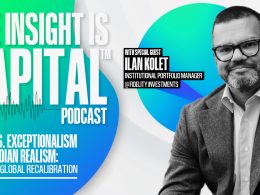Donald Coxe, Chief Investment Strategist, Coxe Advisors LLC's, weekly conference call is an excellent source of outlook and insight from one of the market's foremost thinkers.
GreenLightAdvisor.com has transcribed the February 13, 2009 call in its entirety for your review:
Donald Coxe, February 13, 2009
Thank you all for tuning in to the call that comes to you from Chicago.
The chart that we faxed out; we actually faxed out two of them this time; both of them were from election day, November 4, 2008. The Dow Jones Industrials and Gold. And our question that we asked rhetorically was:
"A difference of opinion on the Obama Program?"
When we're in a situation where the only thing that seems to be working out big time for investors is Gold, then this is hardly a time when the illuminati in Washington are going to be very happy about what's going on. So I want to begin by saying that the question about gold's move is in itself something that we've got to analyze because its so powerful. And, Part of me says that now that there's all of this enthusiasm and all the advertisements that I'm seeing on television from people that I wouldn't want to spend an evening with are saying that you gotta buy gold. This is very reminiscent of the 1979-1980, which was the time that gold peaked in its triple waterfall situation. I don't think that we're anywhere near a top on gold but it still is something in effect where at least if you see it being discussed publicly, its by people who are mildly unsavory.
Well you can't get this kind of move only from the mildly unsavory. And the question is, is the sustained selloff in the stock market at a time we've had a sustained rally in gold are they coming up with different interpretations on the Obama program. I think it is entirely credible to make out a case for buying gold on the basis that the program will work. Because if the program works, then what we're going to have is an economic recovery, but given the sheer scale of what they're pumping into the economy, and the debt that's building up, then it's going to be a 70s style economy in the sense that inflation rates are going to rise from a deflationary type situation, into a postive level and its everybody's best guess as to whether that level is going to be painful or not, but its the kind of thing that would support the financial asset that benefits most from inflationary expectations.
On the other hand, you talk to people about it and what they're saying is 'no', that these two charts are showing you the same thing, which is fear. That they don't believe that the program is going to work; that its just going to make things worse, and therefore they're fleeing out of assets denominated in paper money of all kinds and going into gold. And apparently the justification for that is particularly that the big Swiss banks are seeing is that their high net worth clients are taking out safety deposit boxes and putting gold bullion into them and not the kind of small wafers that are being peddled on television by these somewhat conspiratorial types.
Far be it for me to make the case for gold on the basis that the system is going to collapse. But on the other hand, if you get that value out of gold while still saying that there's a better part of it I think then that's a better story to have and one that I as a strategist who doesn't like to predict armageddon can believe in. Besides which, there's lots of evidence out there that armageddon is not the new consensus.
What we know from the 70s is that if you have a recession at a time of fast money supply growth that what happens is that the stock groups that tend to do best during the recession and to lead you out of the recession tend to be commodities. So the commodities stocks of course, were just hammered after the 'midnight massacre' of July 13, 2008 which is what really launched deflation in the world. But what's interesting is what's happened to them since then in relative strength. We come back to my old faithful of the IBD's 197 industry subgroup rankings and what changes there are in that from week to week. This week, if we take the top 21 stock groups, we see that 7 of them, that is one-third of them are commodity groups led, of course, once again, by metals, ores, gold and silver; they've been at the top for some time. But we've got food flour and grain; we've got oil and gas transport pipeline, we've got oil and gas refining and marketing, I feel very good about the fact that pure refiners have done so well, I can tell you. Food, miscellaneous preparation, retail, wholesale food; and Oil and Gas, International Exploration and Production interestingly enough.
So, what that tells me is that this is the kind of swing at a time when everything looked bad, back in 1974, and by the way, things looked much worse then than they do now, in 1974. We were down to a 6 mulitple on the Dow. And the belief in equities as an asset class was being abandoned on all sides and unemployment was double digit levels and governments were falling; things were much much worse then. But, what you could see was the relative strength of the commodity groups, including, by the way, the supermarkets back then, which is interesting, because the supermarkets are doing well now. So, I would therefore like to take the view that what signals we're getting for the market are that the market like all the pundits, isn't sure that this $2-trillion that's being thrown at the system is going to work. But the belief is if it does work, we're going to have a greater demand for scarce assets, and that everybody recognizes that the huge selloff that we've had in commodities and commodities stocks means that scarcities could come back pretty quickly. And that's exactly what happened in the 70s.
Now, I'm quite sure there's a lot of you out there saying 'you keep talking about the 70s, and its a different world.' It is in many respects, but only in one, I think, that's really crucial, and that is on the real estate side. Because back then what we had was the baby boomers were university graduates having to live with their parents or grandparents because there were no houses available for them. There was a housing shortage because of course, there was no way they could expand the housing market fast enough to take cognizance of the huge number of baby boomers coming out of high schools, community colleges, and universities; well we havn;t anything like that this time, because of the birth dearth that began back then. What we have is a situation where the housing supply was built on the assumption that things would be the same as they had been every other cycle and of course they aren't the same, and they will never be the same the next 50 years. So that's the big difference. We have demographic deflation across the industrial world and in that sense, what it means is that there is one asset class which cannot behave as it did back then. And back then, house prices, although it took them a while to start moving up, even though we had inflation, they did. In any case, you didn't lose money on housing back then.
But as for the stock groups, what's interesting is that despite what we have as this 'pitiest' price for West Texas Intermediate (WTI) of $35 bucks a barrel, what we see is that it seems to be the most artificial of prices because nothing else that you see on the screen relates to it. Oil for delivery in December is $53. Now I have never seen anything like that. I mean, imagine, a 50% premium for ten months. So this relates to the whole question that a battle is going on between Brent and WTI, and Dennis Gartman, and as usual, Dennis is the best at analyzing these things; he's saying that the WTI contract is now just plain silly. Because it relates to such a tiny amount of oil, and the only place in the world where oil is in oversupply is in Cushing, Oklahoma. Well, if we look at other oil prices then, what we're seeing is that despite the huge economic slowdown in the world, that we've got oil for delivery in December 2010, that we can believe these parts of the WTI contract because they are not related to storage problems around Cushing. These are way out on the (futures) curve and we're looking at $60 oil out then.
I think that the fact that the oil stocks, despite the fact that spot WTI has gone to a new low, the oil stocks are actually starting to perform better, is people's recognition that with the cutbacks that OPEC has already delivered and then the evidence that US consumption hasn't fallen by 5%, 6%, or 7% as people thought; those statistics were clouded by what the retail gasoline sales were; and of course, what they did, because retail gasoline was down by 50%, was in trying to adjust for this after you took out state taxes and all these things, people got wrong what the actual volumes there were. So what we see is that the actual demand for oil in the world has not fallen off a cliff. Yes, the demand for industrial goods and consumer goods and ? and things like that has fallen of a cliff. But certainly not for most commodities, and particularly, not for oil. And with the move that we're getting in the fertilizers, and I'd just like to mention once again, the value of the IBD survey, because way down, you get way down the list, number 56 on the list, and you see chemicals and fertilzers [12:23] but that this week and three weeks ago they were down in the depths at 154 and the charts show you that there has been a huge change in attitude towards the fertilizers and indeed towards the agricultural stocks generally.
Now, that's not because I think the world has embraced our view of the strong possibility that the two centuries of global warming have come to an end, and that we might be entering a period of global cooling which would dramatically affect the outlook for crops in the northern hemisphere. No, I think its simply once again the recognition that although demand is reduced somewhat for key grains and feedgrains as a result of the economic slowdown, that it has not collapsed and the carry overs even though they're bigger than they were a year ago, are not so great as to suggest that the prices farmers are going to get for their grain are going to be profitable. Yes, spot corn is $3.66, but the new corn that hasn't been planted yet, which will be delivered in December is $4.07, and corn for the next year after that is $4.25. These are prices, that if you're a farmer who does a good job producing it, could make a lot of money on it, despite the collapse in demand for ethanol. So, what I'm basically saying is that we already have two commodity groups which in the last few weeks have been moving up strongly, and they're basically saying that you don't have to take a bet on how the Obama program works out, as to whether or not this recession is going to drag out a couple more years. You can make money here.
In other words, the savagery with which all commodities and commodity stocks sold off during the collapse, particularly after the Lehman bankruptcy; that is behind us, and now investors are starting to look at what the world will be like if the program succeeds or if it fails, and at the moment, they're not prepared to take bets, big bets on the program succeeding. Now, one of the reasons they're not prepared to take big bets is because of the poor performance of the bank stocks. And, I've told you over and over again, and I'll tell you again, that a bear market which begins with a breakdown in the financials doesn't end until the financials outperform. And, we had that brief period of outperformance, but it was only, as we saw, by the kind of stuff that Alex Rodriguez was consuming. In this case it was financial steroids.
After the Midnight Massacre, when they made it illegal to sell short the bank stocks and also forced the hedgies to unwind their shorts on what they had, it was a situation where the bank stocks rallied to huge premium relative to the performance of the S&P 500, and after that was taken away, which, it was taken away after the end of September, they collapsed on relative strength, and they have not been able to rally from this huge discount on relative strength since then. So, as much as I would like to be able to say that we know that the worst is behind us for the broad stock market and the economy, I can't say it until the bank stocks find a way of rallying.
I watched President Obama's first press conference, and once again was very impressed with this man. He is articulate, he's cool, he's smoothe, he's the real deal. However, we already knew that the stimulus proposal that he was endorsing had been drafted by Nancy Pelosi and friends; Barney Frank and people like that in the House. And therefore [16:30] what it was, was long on a far-left liberal wishlist items that they could never have gotten through Congress on their own, and short on genuine stimulus, such as tax cuts, or on the infrastructure type deals that everybody thought they were going to be emphasize, including $4-billion for ACORN; I mean, that is just staggering to me, that they would do that. ACORN is being charged and being investigated for vote fraud in quite a few states, and they also were also leading the pressure on the mortgage lenders to make 100% loans to Latinos and African-Americans on the interest of social justice. So, I mean, the idea that these people who are going to be able to use the money to get lawyers to defend them against vote fraud charges. That takes chutzpah, to include that in the National Stimulus Bill.
But that's only $4-billion out of $800-billion, but the problem that happened and why the market has sold off since then is the recognition that what we were told was going to be targeted and temporary is anything but. Its all sorts of global-warming type programs, and things that again, maybe depending on your viewpoint, just fine ways to spend the taxpayer's money, but we don't need to work hard to figure out ways to spend the taxpayers' money on a massive deficit. What we need is to do things that get people working.
Now its true, that Keynes famously said its better to pay somebody to dig holes and to fill them in, than not to have any activity at all. And so, what one can probably say about the rest of this bill is that even if you don;t think that a lot of the things they want to do are worth doing, as long as they do them soon, then probably there's an advantage in doing them. The problem is that these will be built in as permanent new government programs which means that trying to deal with the deficit thereafter, will be a challenge beyond the best designs of Larry Summers.
But that's way out in the future. Let's talk about whether right now this is going to work. And once again, we have some evidence to the effect that things are getting better. Money supply growth right through the curve is now moving rapidly, and yes, its true that velocity has collapsed, but the experience of past recessions is, that you first of all grow the money supply, and then eventually, sometimes grudgingly, the velocity comes back, and when that does, then what you can get is a much faster recovery than any of the economists have forecast. I mean, it does turn around pretty rapidly.
So, in this case, we've not only got the remarkable stimulus from the central banks, which should start showing up, across the whole OECD in terms of money supply growth, but in addition, what we have is the bailouts in the banking system, and, again, you can argue wtih why this or that institution is getting help, and this or that institution is not; that's not really important. What is important is that they are helping financial institutions and as long as they help the ones that can actually do something useful, then I'm not going to be too upset if they help those that don't deserve to be helped, namely the big Wall Street banks. Those banks got into trouble because they gave up the business of banking for the business of gambling and speculation in order to create huge bonuses for the insider. There is no case other than counterparty risk case for throwing money at them.
What you need to do is give money to the banks that actually talk to customers face-to-face and do business with them face-to-face about their real needs, their loans, their letters of credit for trade, all of these things. And we had a period when the letters of credit had dried up all over the place across the world, because banks weren't doing this. You couldn't find anybody, because this is a low margin deal and there was a state of panic. What's interesting is that trade does seem to be coming back. We've had a more than a doubling of the Baltic Dry Index; now I know that this is from an absolutely miniscule level - it was down 98%. But we've also got numbers coming out of China indicating that this is one place where they've managed to get both the money supply growing, and the velocity growing. So once again, these guys who say they follow the dictates of Mao, but not of capitalism, are doing a better job on applying Friedman and Keynes, than any of the governments in the so-called capitalist world.
But if you're a commodity stock investor you actually care more about what's happening in China, than what's happening in Chicago. So, i think that you can make the case that the stock market is giving you signals that the economic recovery globally is going to come later in the year, but it will be led by the usual suspects in this decade, namely China and India, because India, although its not growing as fast as it was, is still growing, and they are also very aggressive about monetary expansion and assistance to financial institutions. So, I think, for those of you who have cash, and courage, that, and maybe that have read some of those individuals who are saying that we're already in a depression and the only thing to be in is either cash or selling short, if you don't share that stijian gloom, then you just look at the signals coming out of the IBD itself, as to which stock groups have moved from being blasted, to being in favour, and you can see a lot of stock charts indicating that the market is telling you who is going to lead us out of this. And that's a road map that's very useful.
Now all of this is going to be discussed in much greater detail in Basic Points which I'm pleased to say comes out at the end of next week, but we're working on it now so we're back in harness as it were. I'll end by pointing out that, again, looking at this list what we see is that oddity that if you don't look at the big moneycentre banks, which are still in ghaslty shape as their relative strength goes, there down at the bottom of the IBD list, but what you see is that regional banks, NorthEast, Midwest, Southeast, these banks that are banks and don't create collateralized debt obligations, these stock groups are outperforming. There is one other group that's come up strongly in the list, and I'm not sure that I can tell you what it means, but funeral services is another booming business and maybe this is a good time to stop and take your questions, because maybe I'm putting too much emphasis on which stock groups are attracting attention .
Let me sum it up by saying, I believe that going to the great economists of the past, that even if so much of what's being done here is being done with bad motives, and its being given to bad people, its better probably than doing nothing, and by the way, I sort of admired Obama's chutzpah is saying that the opposition were the Republicans who weren't voting for this confection of Nancy Pelosi and left-wing of the party were in favour of doing nothing. It wasn't the case at all. It was that they wanted to have tax cuts and targeted programs which was what had been promised three weeks before. I think, take the political debate out of it. This is the administration that won the election. These are the ones that are in power, there's no point going off and insulting and what is likely here, is that we're going to get a turn. Ans so, with that I believe that you follow the signals themselves and the groups that outperforming right now are likely to be the groups that will be outperforming 6 months from now. That's the way it was in the 70s and as I say the only difference between now and the 70s is about an asset class that you're not going to get much enthusiasm right now anyway, which is real estate. That's it. Any questions?
(27:07 End of prepared portion)












